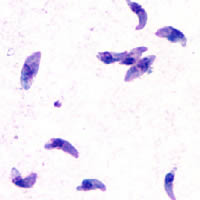
Photo from wikipedia
Aim SARS-CoV-2 infection is a world-wide public health problem. Several aspects of its pathogenesis and the related clinical consequences still need elucidation. In Italy, Sardinia has had very low numbers… Click to show full abstract
Aim SARS-CoV-2 infection is a world-wide public health problem. Several aspects of its pathogenesis and the related clinical consequences still need elucidation. In Italy, Sardinia has had very low numbers of infections. Taking advantage of the low genetic polymorphism in the Sardinian population, we analyzed clinical, genetic and immunogenetic factors, with particular attention to HLA class I and II molecules, to evaluate their influence on susceptibility to SARS-CoV-2 infection and the clinical outcome. Method and Materials We recruited 619 healthy Sardinian controls and 182 SARS-CoV-2 patients. Thirty-nine patients required hospital care and 143 were without symptoms, pauci-symptomatic or with mild disease. For all participants, we collected demographic and clinical data and analyzed the HLA allele and haplotype frequencies. Results Male sex and older age were more frequent in hospitalized patients, none of whom had been vaccinated during the previous seasonal flu vaccination campaignes. Compared to the group of asymptomatic or pauci-symptomatic patients, hospitalized patients also had a higher frequency of autoimmune diseases and glucose-6-phosphate-dehydrogenase (G6PDH) deficiency. None of these patients carried the beta-thalassemia trait, a relatively common finding in the Sardinian population. The extended haplotype HLA-A*02:05, B*58:01, C*07:01, DRB1*03:01 [OR 0.1 (95% CI 0–0.6), Pc = 0.015] was absent in all 182 patients, while the HLA-C*04:01 allele and the three-loci haplotype HLA-A*30:02, B*14:02, C*08:02 [OR 3.8 (95% CI 1.8–8.1), Pc = 0.025] were more frequently represented in patients than controls. In a comparison between in-patients and home care patients, the HLA-DRB1*08:01 allele was exclusively present in the hospitalized patients [OR > 2.5 (95% CI 2.7–220.6), Pc = 0.024]. Conclusion The data emerging from our study suggest that the extended haplotype HLA-A*02:05, B*58:01, C*07:01, DRB1*03:01 has a protective effect against SARS-CoV-2 infection in the Sardinian population. Genetic factors that resulted to have a negative influence on the disease course were presence of the HLA-DRB1*08:01 allele and G6PDH deficiency, but not the beta-thalassemic trait. Absence of influenza vaccination could be a predisposing factor for more severe disease.
Journal Title: Frontiers in Immunology
Year Published: 2020
Link to full text (if available)
Share on Social Media: Sign Up to like & get
recommendations!